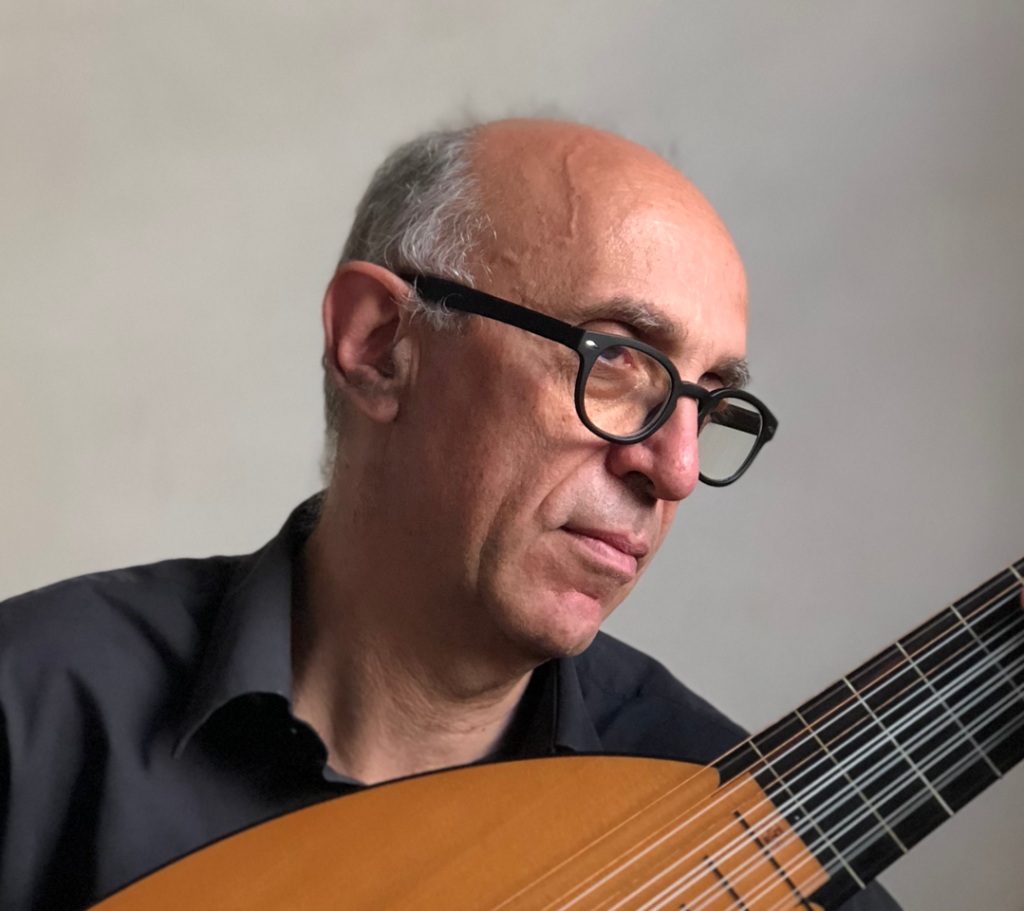
Ha studiato liuto con Diana Poulton, Anthony Bailes e Hopkinson Smith. Si è diplomato in liuto presso il Conservatorio di Bari e presso il Royal College of Music di Londra. La passione per la ricerca sulla storia e la letteratura del liuto lo ha portato a scoprire fonti musicali inedite e a realizzare diversi progetti discografici: per la casa E lucevan le stelle, ha registrato due CD: J’ay pris amour, dedicato al manoscritto cordiforme conservato presso la Biblioteca Oliveriana di Pesaro, considerato la più importante fonte liutistica prima delle stampe di Petrucci; e Folias, musiche da fonti manoscritte seicentesche dell’Italia centrale per chitarra, tiorba e liuto, tra le quali un manoscritto recentemente ritrovato nelle Marche contenente brani inediti del chitarrista Giovanni Paolo Foscarini.
Inoltre, per la Stradivarius ha inciso un programma tratto da Il Fronimo di Vincenzo Galilei. Il suo ultimo CD solistico, Viaggio musicale, è un percorso attraverso la storia del liuto e della chitarra. Un’intensa attività concertistica lo ha portato a suonare nei più importanti festival italiani e stranieri. Come solista tiene numerosi recital con un repertorio che spazia dal rinascimento e barocco italiani agli autori del ‘700 tedesco (J.S. Bach e S.L. Weiss).
Da sempre appassionato didatta, ha esposto i suoi principi nel Metodo per liuto rinascimentale pubblicato dalla casa editrice Ut-Orpheus di Bologna, che è considerato un testo di riferimento in questo ambito. È titolare della cattedra di Liuto presso il Conservatorio Santa Cecilia di Roma – dove tiene anche corsi di Storia degli strumenti a pizzico e di Chitarra dell’800 – e impegnato come docente a contratto presso il Conservatorio O. Respighi di Latina. La sua attività didattica ha contribuito negli anni a formare alcuni dei migliori esponenti della scuola italiana di liuto. Ha insegnato per lunghi anni ai corsi internazionali di musica antica di Urbino e viene invitato a tenere corsi e masterclass (Nepi, Festival Stradella).
È stato presidente della Fondazione Italiana per la Musica Antica dal 2007 al 2019.
He studied lute with Diana Poulton, Anthony Bailes e Hopkinson Smith. He graduated at the Conservatory of Bari and at the Royal College of Music. His passion and dedication to research the history and literature of the lute has lead him to discover new and unseen musical sources, thus allowing him to produce many discographic projects. For the record label E lucevan le stelle, he produced 2 CD’s: J’ay pris amour, dedicated to the cordiform manuscript preserved at “Biblioteca Oliveriana di Pesaro”, considered to be the most important source for lute predating the first prints by Petrucci himself; and Folias, music from manuscripts dating back to central Italy during the 17th century for guitar, lute, theorbo, including a manuscript that was recently found in the region of Marches that contained unseen compositions and works from guitarist Giovanni Paolo Foscarini.
Furthermore, he recorded Vincenzo Galilei’s Il Fronimo for Stradivarius. His last CD Viaggio musicale, in which he performs as a solist, is a musical journey through the history of the lute and guitar. A very intense concert activity has lead him to perform in some of the most famous and reknown italian and international music festivals. As a soloist he performed in many recitals, with a repertoire that spans from the Italian reneissance and baroque music, to composers and figures from 18th century Germany, for e.g. J.S. Bach e S.L. Weiss.
Very passionate teacher and researcher, Andrea Damiani has developed his studies and his musical principles by publishing the book Metodo per liuto rinascimentale with the publishing house “Ut- Orpheus” of Bologna. His book is considered to be a major reference point to all lutists. He is a tenured professor at the Rome Conservatory of Santa Cecilia, where he teaches lute, guitar (of the 19th century) and teaches the history of early stringed instruments. He undertakes the same courses as a contract teacher at Conservatory O. Respighi of Latina. His work as a teacher and researcher has allowed him to mature talented and skilled pupils that have become some of the most prominent figures within the italian music environment. He has taught for many years at international courses in Urbino, and he is often invited to hold masterclasses and courses in Italy, e.g.: Nepi, Festival Stradella. He has been president of the Italian Early Music Foundation (Fondazione Italiana per la Musica Antica) from 2007 until 2019.
